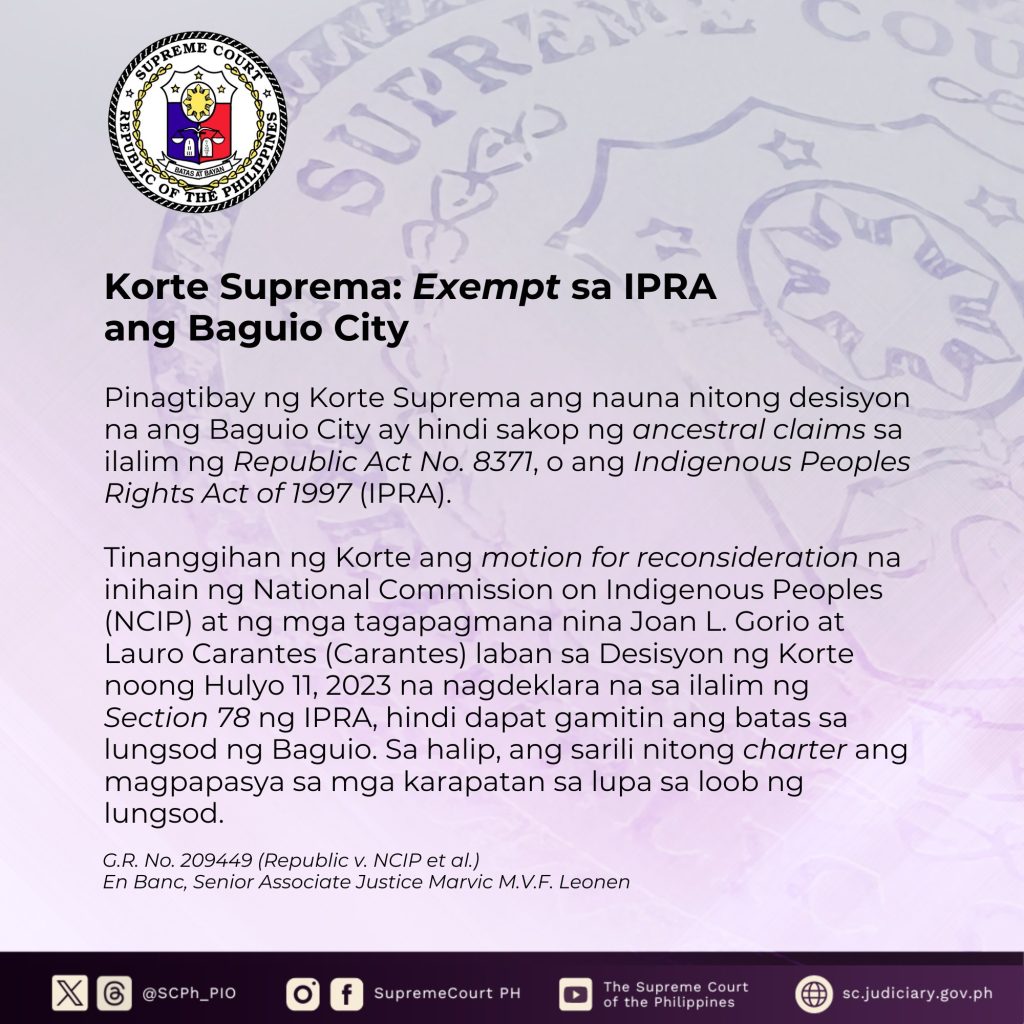
December 20, 2024 – The Supreme Court of the Philippines has confirmed that Baguio City is exempt from ancestral land claims under the Indigenous Peoples Rights Act of 1997 (IPRA), also known as Republic Act No. 8371.
In a recent resolution authored by Senior Associate Justice Marvic M.V.F. Leonen, the Court En Banc dismissed a motion for reconsideration submitted by the National Commission on Indigenous Peoples (NCIP) and the heirs of Joan L. Gorio and Lauro Carantes. This motion contested the Supreme Court’s decision made on July 11, 2023, which stated that Section 78 of the IPRA exempts Baguio City from its provisions, asserting that the city’s own charter governs land rights.
The background of this case dates back to 1990 when the heirs of Carantes filed for ancestral claims over certain parcels of land in Baguio City, asserting their rights as part of the indigenous Ibaloi community. The IPRA, enacted in 1997, recognizes and protects the rights of indigenous peoples to manage their ancestral lands, defined as areas held since time immemorial.
Following the implementation of the IPRA, these ancestral claims were assigned to the NCIP, which granted certificates of ancestral land titles to the heirs in 2008. The NCIP concluded that their ancestral rights persisted despite the lands being designated as a government reservation since Baguio City was declared a townsite reservation in 1907.
However, the Office of the Solicitor General (OSG) contested the NCIP’s ruling before the Court of Appeals, arguing that Baguio City’s status exempted it from the IPRA, and thus the NCIP lacked authority to issue land titles. The Court of Appeals initially sided with the heirs and NCIP, prompting the OSG to escalate the matter to the Supreme Court.
In its July 2023 ruling, the Supreme Court concluded that due to Baguio City’s designation as a Townsite Reservation, it is not governed by the IPRA. The Court emphasized that existing proclamations regarding property rights take precedence over IPRA stipulations.
Although Baguio’s exemption from IPRA means that indigenous peoples cannot claim ancestral rights through this law, they can still establish ownership if they demonstrate continuous occupation of the land since time immemorial. However, in this case, the heirs failed to provide sufficient evidence of their ongoing possession of the disputed land.
Consequently, the Supreme Court annulled previous decisions by both the Court of Appeals and NCIP, leading to their motion for reconsideration being denied. The Supreme Court reiterated that while Baguio City is exempt from IPRA, claims related to native title can still be pursued if there is proof of actual possession.
The Court highlighted that for a native title claim to succeed, indigenous peoples must show open and continuous possession of the land up to the present, thus establishing a vested property right through standard land titling processes rather than through IPRA.
As the heirs of Carantes could not establish current possession of the claimed land due to other occupants, their motion was ultimately rejected.
This information is provided by the Supreme Court Public Information Office as a summary of the recent ruling. For detailed insights, refer to G.R. No. 209449 (Republic of the Philippines v. National Commission on Indigenous Peoples).
The article was first featured on Philippine Supreme Court website on December 2024. To view the original article, please click here.
